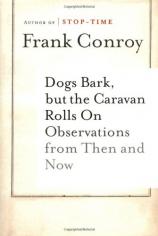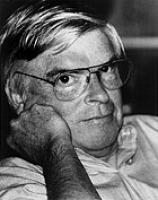Dogs Bark, But the Caravan Rolls On: Observations Then and Now
Review
Dogs Bark, But the Caravan Rolls On: Observations Then and Now
In this fine collection, Conroy collects 22 of his articles and
essays, spanning a quarter of a century, in which he takes on big
subjects: childhood, fatherhood, family, education, writing, and
jazz.
Perhaps best known as the director of the renowned University of
Iowa Writers' Workshop, Conroy devotes two fascinating pieces to
how he learned to write and how he believes writing should be
taught. Throughout, Conroy's own writing sparkles with clarity,
insight, creativity, and passion.
Conroy devotes the early pieces to his childhood. His father was a
taciturn, emotionally inaccessible manic depressive whose only real
legacy to his son was a huge library. As a boy, Conroy read
hundreds of books --- he describes his desire to write as a logical
extension of his love for reading. From the beginning, Conroy
viewed words as something magical and liberating --- his writing
certainly reflects the importance with which he views the
craft.
We get pieces on Conroy's 1940s and '50s youth in New York City,
his introduction to the mysteries of girls, the pool hall, his love
of music, and the energy of Harlem's jazz scene.
When Conroy attends a Quaker college near Philadelphia, it is there
that he learns to write --- one of the included pieces is about a
Professor who becomes a mentor and helps teach him to write. Conroy
also befriends two famous jurists at college, Supreme Court Justice
William Douglas and the legendary Judge Learned Hand. These "youth
and college" pieces give us a real sense of Conroy's voracious and
wide-ranging curiosity. He manages to be a devoted fan of both the
big city and the small town.
Conroy then offers three insightful pieces on fatherhood. After a
divorce from his first wife, with whom he has two sons, he meets
Maggie. They fall in love and, with Conroy past 50, they have a
son. What do fathers do, and how does one learn to be a "good"
father? Conroy's father was certainly no model: "I barely knew my
own father," Conroy writes. Still, he learned that "[p]aying
attention is where everything starts." Mostly, a father must learn
how to love, and this takes practice.
When Conroy writes about music, as he does in the second half of
DOGS BARK, we feel we're in the hands of a master. Conroy is
himself an acclaimed jazz pianist, even winning a Grammy Award in
1986, and he offers us two brilliant pieces on the trumpeter Wynton
Marsalis --- meditations on the history and allure of jazz. We are
also treated to pieces about pianists Keith Jarret and Peter Serkin
as well as the Rolling Stones. Conroy doesn't think much of Mick
Jagger, whom he considers something of an egomaniac: "Jagger is
indeed the point, and the music becomes no more than the frame for
his performance." As for Mr. Marsalis, Mr. Conroy obviously admires
his virtuosity and his seriousness of purpose.
What holds these pieces together is Conroy's rabid curiosity and
his passion for lucid communication. DOGS BARK gives the reader a
lot to shout about. Conroy looks with clear and searching eyes at
his own life and at the world around him. The results are
delightful: Conroy's book deserves a wide readership.
--- Review by Chuck Leddy
Dogs Bark, But the Caravan Rolls On: Observations Then and Now
- Publication Date: April 22, 2002
- Genres: Nonfiction
- Hardcover: 240 pages
- Publisher: Houghton Mifflin Harcourt
- ISBN-10: 061815468X
- ISBN-13: 9780618154685




